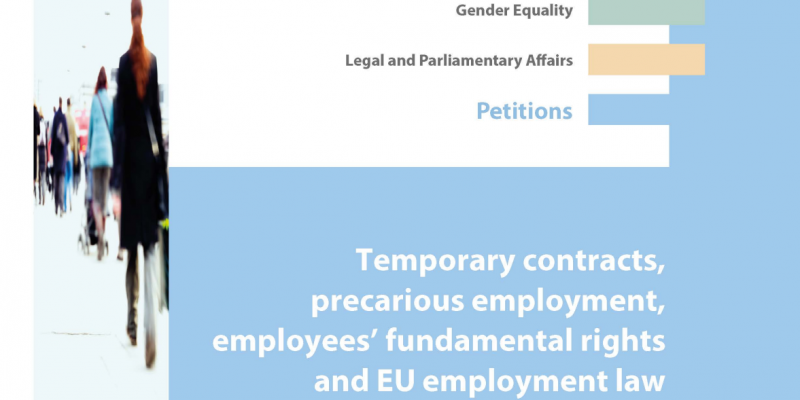Study recommends EU action to protect atypical workers

A recent study explored ‘Temporary contracts, precarious employment, employees’ fundamental rights and EU employment law‘, commissioned by the European Parliament’s Policy Department for Citizens’ Rights and Constitutional Affairs at the request of the Committee on Petitions. The findings have implications for journalists, as atypical and precarious employment has been tied to media industries and digitisation.
The study emphasises that precarious employment is a fundamental rights issue of enormous weight and significance within the EU’s normative order. Some groups, such as women and younger workers, are more affected by precarious employment.
Self-employment, which affects many freelancers and journalists, is discussed in the study as it compares the rights of employees and self-employed. The study finds that self-employed people are entitled to just 4 of the 26 rights granted to employees, and lack basic rights including minimum wage, parental leave, and sick pay.
The study identifies a range of gaps that may reinforce precarious employment. These “protective gaps” include gaps in employment protection, representation and enforcement. Protective gaps are a result of deficiencies in EU secondary law, self-restraint by the Court of Justice of the European Union (CJEU), and limited effectiveness of EU law due to inadequate transposition and enforcement of labour standards at EU member state level.
The study argues that a reduction of precarious work is more likely to be achieved in societies where more inclusive, equal and effective labour standards are upheld. There are links between working time, such as minimum hours, and precariousness. In addition, the study identified a relationship between atypical forms of work and the regulation of the employee’s right to know of the conditions applicable to their contract or employment.
Recommendations made by the study are based on the assumption that the socially-progressive goal of reducing precarious work in the EU should be pursued on the basis of inclusive, equal and effective labour standards. Recommendations include:
- Extension of employment protection coverage through the adoption of a broader definition of “worker” that applies across all EU labour law directives.
- Promotion of the role of multi-level collective bargaining
- Addressing the time- and organisation-based dimensions of precariousness through revising the Atypical Work Directives and the Working Time Directive
- Developing more holistic mechanisms for ensuring effectiveness of labour standards, including improved access to information about employment conditions and access to justice.
Despite these recommendations, however, the study notes that the legal system may be two-sided in its dealings around precarious employment, as on the one hand it may lessen the risk of precariousness in increasing employment protection coverage, but at the same time this may limit collective bargaining. Therefore, there is a need for holistic action as the target constantly moves.
Full report available here
Photo credit: Creative Commons CCO











